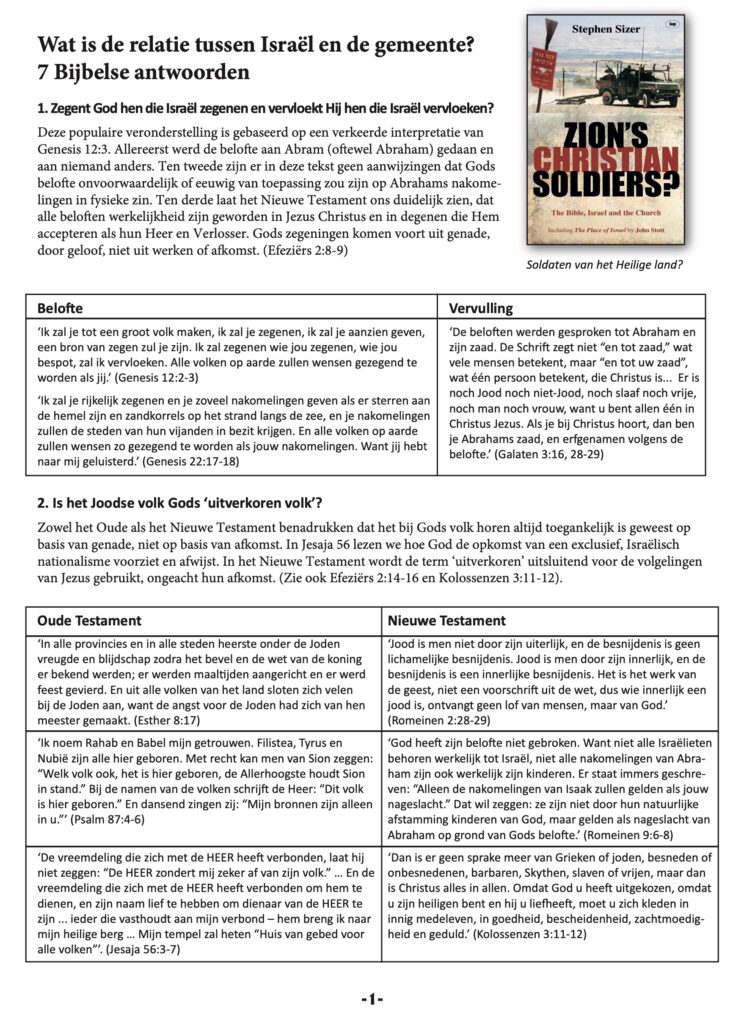
We are pleased to provide a Dutch translation of the four page leaflet summarising my book Zion’s Christian Soldiers. You may also download a 7 page version which is less compact.
The leaflet has now been translated into:

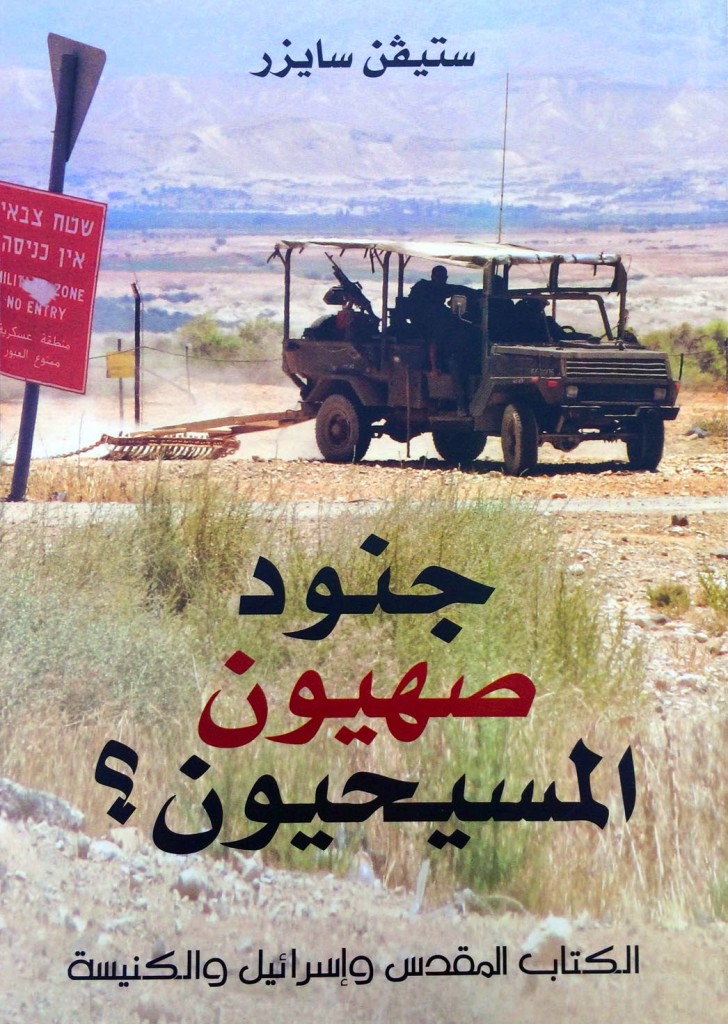
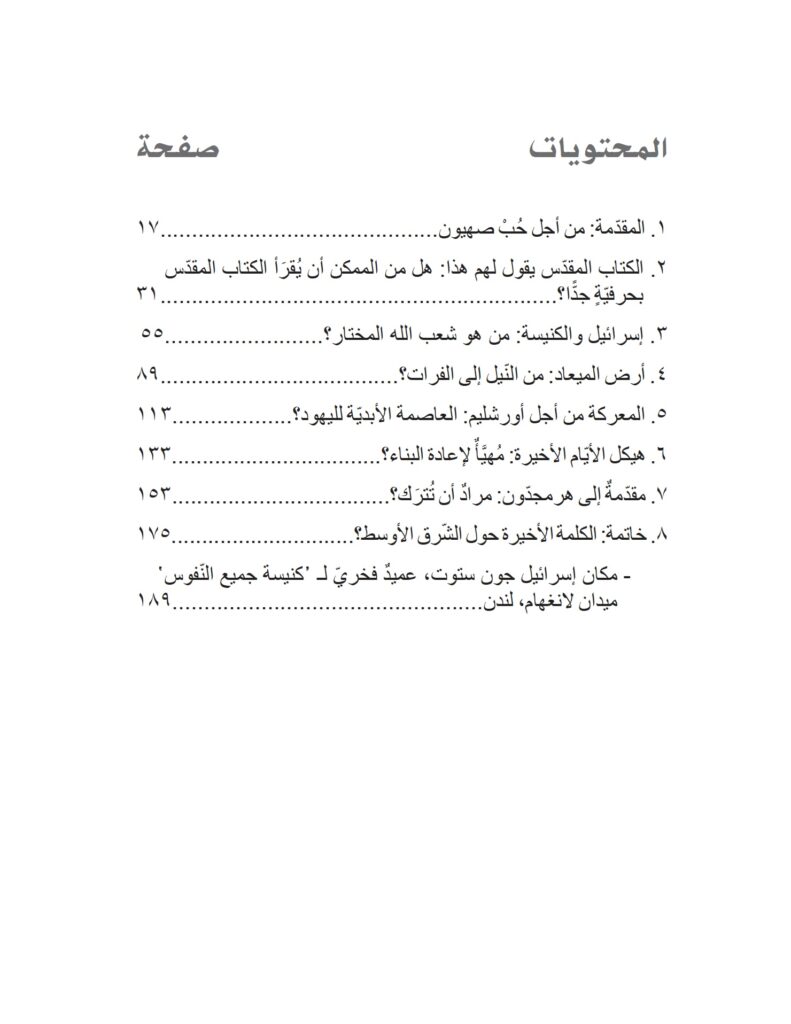
The Arabic edition of my book Zion’s Christian Soldiers: The Bible, Israel and the Church is now available as a pdf download
The print version of the Arabic edition of Zion’s Christian Soldiers was published by the Anglican Publishing House in Cairo and is also available and costs £8.95 plus £2.75 postage in the UK and £4.75 internationally. Order via PayPal.
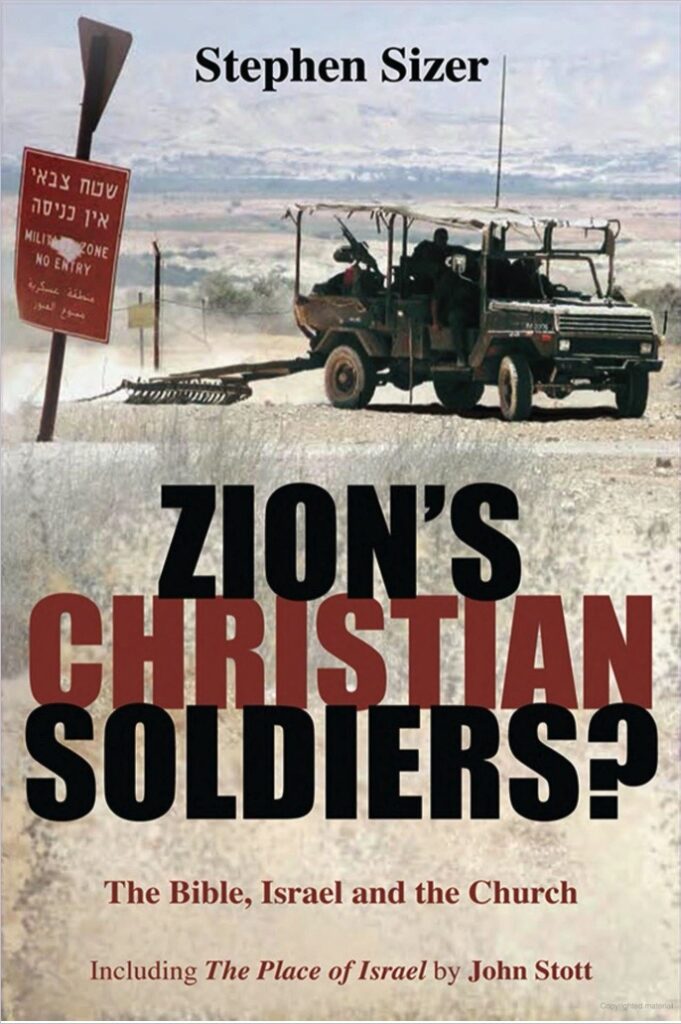
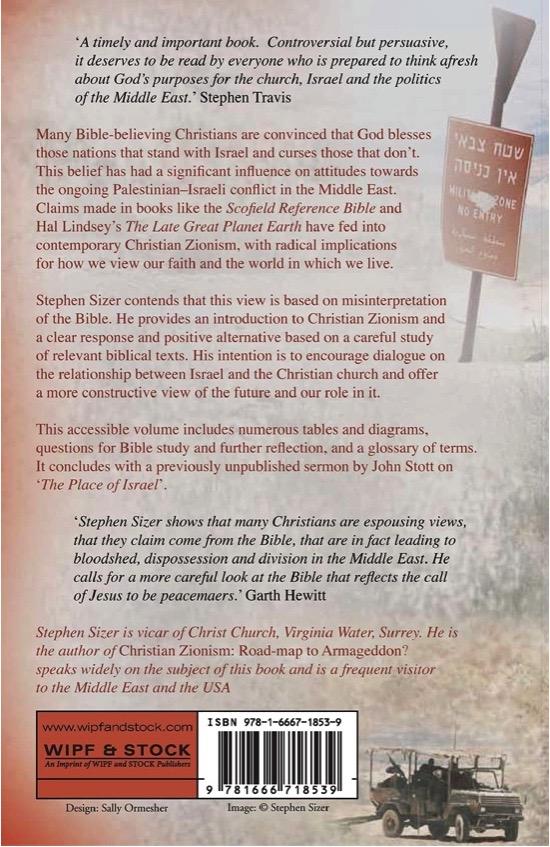
I am delighted Wipf & Stock have chosen to republish the English edition of my book, Zion’s Christian Soldiers. You can preview come of the content here. Available from Amazon or direct from the publishers.
“Once again Stephen Sizer has produced a seriously worked out biblical theology which challenges some Christians who give uncritical support to the current political stance of Israel. We have here a serious biblical challenge, evangelical in character which, nevertheless, challenges certain kinds of fundamentalism, both theological and political. I commend Stephen’s latest book warmly, not with the conviction that everyone will agree with it, but that all ought to engage in its argument for the very sake of the Peace of Jerusalem itself, now the Holy City of the three great monotheistic faiths, the faiths of the Children of Abraham.” The Right Reverend Christopher Hill, former Bishop of Guildford
‘Stephen Sizer’s new study offers a fresh and insightful approach to reading the Bible. With magisterial skill he challenges Christian Zionists and provides a comprehensive framework for understanding the true meaning of Scripture.’ Rabbi Professor Dan Cohn-Sherbok
Continue reading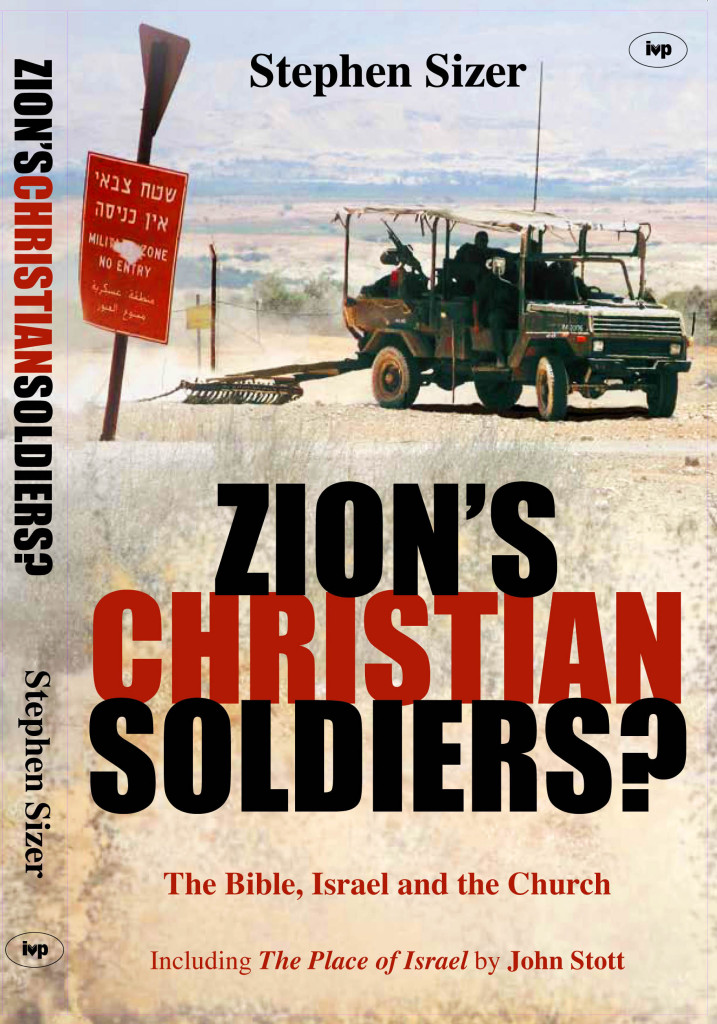
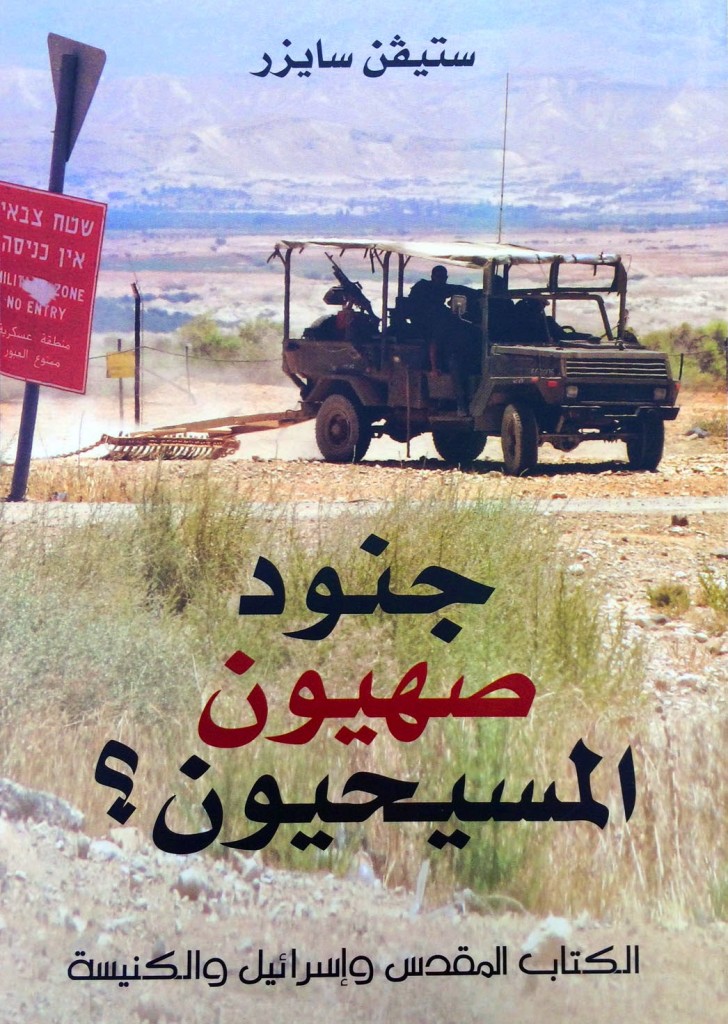
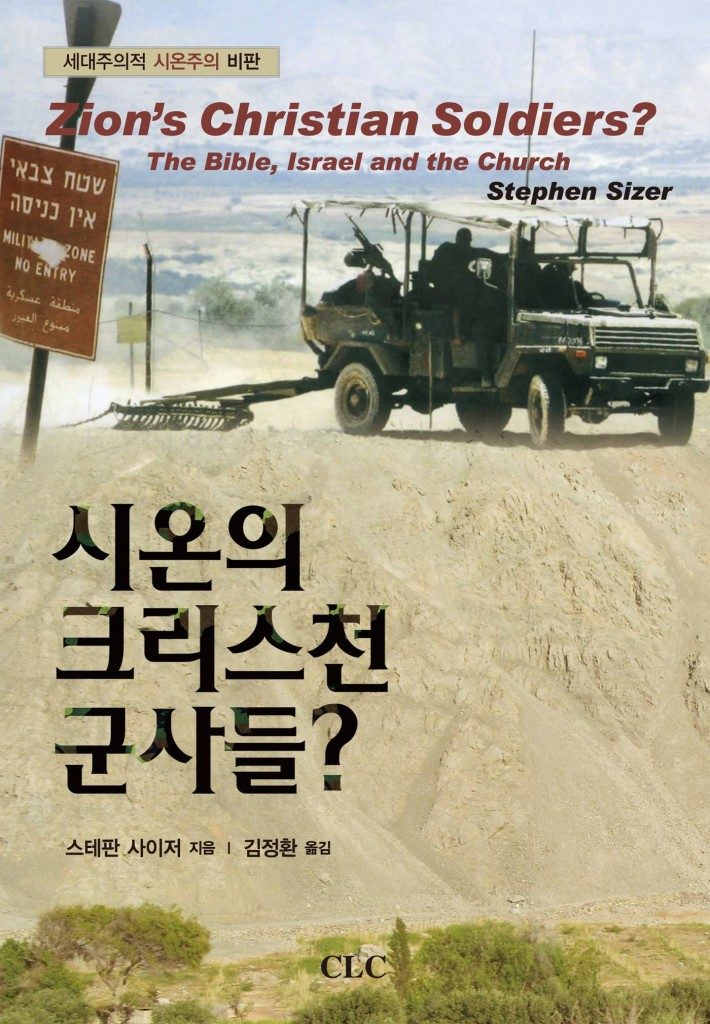
Zion’s Christian Soldiers is now available on Kindle
“Few themes in biblical studies could be as important. Christian Zionism has brought to the church an interpretation of Israel and the Bible that future generations will criticize harshly. It is every Christian’s obligation to understand what they are saying and how it should be evaluated. Writing in a style that is accessible to everyone — and a passion that is sure to ignite strong responses — Sizer outlines the landscape of the problem and its solution.” Professor Gary M. Burge, Professor of New Testament, Department of Biblical & Theological Studies, Wheaton College & Graduate School (author of Whose Land, Whose Promise? What Christians Are Not Being Told About Israel and the Palestinians)
Read more reviews here
Continue reading The latest edition of Churchman, published by the Church Society, includes a review of Zion’s Christian Soldiers written by Ed Moll,
The latest edition of Churchman, published by the Church Society, includes a review of Zion’s Christian Soldiers written by Ed Moll,
“Does God have a purpose for the nation and land of Israel today? This is a major point of difference between Dispensational and Covenantal readings of the Bible. In Zion’s Christian Soldiers Sizer exposes the foundations of Dispensational views, and the error of their strong support for certain views about Israel today. Given the widespread influence of this school of thought, there is the frightening propsect that the US might adopt foreign policy under (Dispensational) Christian influence.
The key issue in understanding the relationship between Israel and the Church is to read the Bible literally and contextually. Ultra-literalists ignore the historical settingof prophetic and apocalyptic passages and then read contemporary events back into prophetic passages. As a consequence Old Testament texts are made to speak about present and future events almost as if the New Testament had never been written. But by reading the Bible as a whole and in context it becomes clear that there is not, in fact, two chosen people (Israel and the church) but one (Israel and now the church).
A second consequence is that those who believe the promises made to Abraham still apply to his phisical descendents today oppose the dismantling of Jewish settlements in Gaza and the Occupied Territory; but the Bible makes clear that the Land is God’s and that residence in it was always conditional on faithful obedience. Jesus redefined the kingdom as a spiritual and heavenly reality, which is why the New Testament teaches that the land has served its purpose: ‘it was and remains, irrelevant to God’s on going redemptive purposes for the world’ (p. 98). In a similar way, Christians are to look to Jerusalem as a vision of a city inclusive of all nations-not as a place which must remain undivided at all (political) costs.
Two of the stranger beliefs promoted by Dispensationalist thinking are the rebuilding of the Temple, and the Rapture. Attempts by Zionists (Jewish and Christian) to rebuild the Temple are taken seriously by the political authorities, and may well ignite an apocalyptic war with Muslims worldwide. But when Jesus died to atone for our sins, the temple in Jerusalem became redundant: that is why Sizer must say that ‘To advocate rebuilding the Temple is heresy’ (p. 130). The Rapture is ‘the novel idea that Jesus will return twice’ (p. 131), made popular by the hugely successful “Left Behind” books. It accompanies an outlook which is inherently pessimistic about the Middle East and looks for an “Armageddon” confrontation. But biblical references to Armageddon do not necessarily lock us into believing there has to be an apocalyptic war between Islam and Christianity; surely as peacemakers, Chrisitans can have nothing to do with stoking such a conflagration.
The key issue remains, ‘What difference did Jesus’ coming make to traditional Jewish hopes and expectations?’ Sizer shows by his clear and direct treatment how Dispensational writers (including Hagee, Scofield, Darby and Hal Lindsey) fail to address this question. This is a clear and helpful book, which requires no prior understanding of Dispensationalist thinking. It will equip the reader to understand these views and to appreciate what is at stake when thoswe who believe these things try to make governments and Christians follow them.”
Ed Moll
Vicar of St George’s, Wembdon, Somerset
and a Trustee of the Latimer Trust

Published in Mishkan, A Forum on the Gospel and the Jewish People: Issue 55/2008
The following quotations are taken from an article by Tony Higton published in Mishkan which includes a response to my book, Christian Zionism: Road-map to Armageddon?
Tony Higton is Rector of North and South Wootton near Kings Lynn. The fact that I was married in South Wootton and my mother in law lives in the parish is purely, if delightfully, coincidental. Tony previously served as the General Director of the Church’s Ministry among Jewish People and Rector of Christ Church, Jerusalem. Before publishing my book, he read the draft sections pertaining to CMJ, made comments, and these were all incorporated in the published version.
I warmly commend his article and the case he makes for Moderate Christian Zionism, and invite you to read it and decide whether the selective quotations below, which specifically pertain to my views or book, are in any way taken out of context.
In his introduction, Tony writes:
“After years of sparring, Stephen Sizer and I met up and found we had wide areas of agreement. Having worked in Jewish ministry for seven years, half of them in Jerusalem, I have seen the best and worst of Christian Zionism. Insofar as it combats anti-Semitism, defends the existence of a safe homeland for Jewish people, promotes evangelism among Jewish people, and supports reconciliation in the Holy Land, it is good.
However, Sizer is right to criticize the serious failings of some Christian Zionism. I agree with him in rejecting the following errors which are held by many Christian Zionists:
In the second section entitled, “Dangers of Unbiblical Views” Tony writes:
“I am grateful for Sizer’s book because it stimulates thought and, in my case, underlines many of the questions I have been asking about Christian Zionism in recent years. And I speak currently describing myself (provocatively) as a pro-Palestinian Christian Zionist!”
“Having said that, I am unhappy about calling myself a Zionist because of the prevalence of extreme Christian Zionism which Sizer describes. I attended a week-long conference on Christian Zionism held in Jerusalem by the Sabeel Palestinian Liberation Theology Centre. Initially, I was quite irritated by what I felt was their extreme model of Christian Zionism. I thought it was a caricature and the moderate view I held was the majority view. But one of the main things I learned from that conference was that it is American Christian Zionism (which is very influential among Messianic believers in Israel) which is dominant, and it is very extreme. British (and other moderate) Christian Zionists need to understand this.” (pp. 19-20)
In the fourth section entitled, “Putting Principles into Practice”, Tony writes:
“Sizer seems not fully to understand the Israeli need for security. We once stood together in Abu Dis, just outside Jerusalem, at the foot of the security wall – ten meters of concrete towering above us. He asked me: “Well, what do you think of the wall, Tony?” I replied: “I think it is obscene. But terrorism is even more extreme.” (p. 24) – on this I concur.
In the fifth section in which Tony makes the case for “Moderate Biblical Zionism” he writes:
“It seems to me that Sizer, in his convert’s passion for justice for the Palestinians, tends to throw the baby out with the bathwater with respect to Christian Zionism. One result is that he does not treat the biblical material seriously enough… I still believe that a biblical case can be made for (balanced and moderate Christian Zionism).” (p. 25)
“Sizer raises various criticisms of the biblical justification Christian Zionists claim. In particular he claims that Christian Zionism has an “ultra-literal” and futurist hermeneutic. It is, of course, very simple to make out that all the prophecies referred to by Christian Zionists are not to be taken literally as referring to the Jewish people. In one stroke it removes all sorts of questions and difficulties. But, as we shall see, there are difficulties with this view.
I am also aware that the New Testament radically develops the teaching of the Old Testament. The Old is the bud and the New is the flower. In rightly stressing the Jewish roots of the Christian faith, we must never forget this radical development, which Sizer stresses. So there are important developments of land to world, temple to Jesus, etc.” (p. 25-26)
“I is true that some, including some Orthodox Jewish people, think that such a re-establishment of the state is not the real thing prophesied in Scripture, which could only be established by Messiah. Others, including Sizer, think Israel, because of disobedience to God, could lose the land again.” (p. 28)
“Sizer writes: “Belief in the final restoration of the Jews to Zion is also based on a literal and futurist reading of selective Old Testament prophecies. However, the texts themselves indicate that such a return occurred under Ezra and Nehemiah and that no further return is to be anticipated. It may be argued that Jesus repudiated any such expectation. New Testament writers apply such Old Testament promises to both believing Jews and Gentiles.”
However, there are OT prophecies which scholars believe relate to a time much later than the return under Ezra and Nehemiah, and are often in a messianic context. I refer to Isaiah 11:11-12; 60:4, 9, 21-22; 61:4-5; Jeremiah 3:12-18; 23:7-8; Ezekiel 38:8, 16; 39:25-29; Joel 3:1-2, 17, 20; Amos 9:14-15; Zechariah 12:2-3, 10-11; and 14.” (p 29)
“In conclusion, then, I agree with much of the criticism Sizer makes of Christian Zionism and particularly of its lack of commitment to justice and reconciliation. Like him, I too reject the extremes of Christian Zionism, seen particularly in the USA and Israel. However, I believe Sizer throws the baby out with the bathwater, particularly by not dealing seriously enough with the biblical material, which I believe forms a credible foundation for a balanced, moderate Christian Zionism.
Moderate Christian Zionists will:
Having read Sizer’s book carefully, I remain a pro-Palestinian Christian Zionist who is passionate about justice and reconciliation and sensitive to the needs, pain, and fears of both Palestinians and Israelis.” (p. 29)
It was in part to encourage further dialogue on the interpretation of Scripture regarding the relationship between Israel and the Church that I wrote the sequel, Zion’s Christian Soldiers. I look forward to further conversations with Tony Higton on the case for Moderate Christian Zionism.
 14 May 2008 marked the 60th anniversary of the birth of the modern State of Israel. The fundamental problem in the long-running Israel/Palestine dispute is that Jews in the newly formed Israel stole land from the indigenous Arabs, taking it by force. Insofar as Britain and the international community provided the authority, they did so in the face of understandable opposition from those adversely affected. The horrendous fact that Christian evangelicals have to face now is that this theft, with all its subsequent misery for hundreds of thousands of people, was done in their name. Scofi eld Dispensationalism was strong in the 1940s and still lives on, represented in a number of popular Christian books that promote Christian Zionism.
14 May 2008 marked the 60th anniversary of the birth of the modern State of Israel. The fundamental problem in the long-running Israel/Palestine dispute is that Jews in the newly formed Israel stole land from the indigenous Arabs, taking it by force. Insofar as Britain and the international community provided the authority, they did so in the face of understandable opposition from those adversely affected. The horrendous fact that Christian evangelicals have to face now is that this theft, with all its subsequent misery for hundreds of thousands of people, was done in their name. Scofi eld Dispensationalism was strong in the 1940s and still lives on, represented in a number of popular Christian books that promote Christian Zionism.
Our belief in future blessing for the Jewish people and our commitment to their evangelisation, neither of which are challenged in the books here reviewed, has for many become mired in a confused eschatology rooted in bad exegesis, resulting in an obsession with land which the New Testament cannot sustain. This is not to deny the tragedy of the world’s treatment of Jews over centuries. Unfortunately millions of conservative evangelicals have supported a solution that has involved replacing one tragedy with another. Millions support Christian Zionism.
The writers of Light Force try to provide a Christian answer to the political conflict. The first edition (I read the American version) was an absorbing read and I look forward to seeing the second. In Light Force, Brother Andrew (of God’s Smuggler fame) tells of his personal journey of understanding, starting at the usual stereotyped dispensational beliefs about Israel, through to meeting Christians of all hues, which led to some understanding of the pressures Christians in Israel live with day to day. Most of the focus on Christians is on Arabs in Lebanon, Bethlehem and Gaza. The book gives a good introduction to the complex situation in Israel. It focuses mainly on issues of reconciliation between Jew and Arab, arguing that this should be possible and is most likely among Christians who are already one in Christ Jesus.
The book is an emotional read, challenging Christian Zionism at the level of personal experience. Even Moslems who hate Jews become real people as we see them being confronted by Brother Andrew and asked to forgive and make peace. I just wish Andrew’s role had been less hyped up.
 Stephen Sizer’s Zion’s Christian Soldiers? is quite different in style to Andrew’s book, requiring more application from the reader, but it also challenges Christian Zionism. Sizer compares covenantalism and dispensationalism. He explores the relationship between the old and new covenants and shows the danger of taking contemporary events to be the realisation of biblical prophecy. He examines the question of who the Israel of God is, and emphasises the centrality of Christ in the Bible message and the oneness of His people. The land is considered both in its importance in the Old Testament and the relative silence about it in the New, where God’s kingdom on earth is international and His people look for a better inheritance.
Stephen Sizer’s Zion’s Christian Soldiers? is quite different in style to Andrew’s book, requiring more application from the reader, but it also challenges Christian Zionism. Sizer compares covenantalism and dispensationalism. He explores the relationship between the old and new covenants and shows the danger of taking contemporary events to be the realisation of biblical prophecy. He examines the question of who the Israel of God is, and emphasises the centrality of Christ in the Bible message and the oneness of His people. The land is considered both in its importance in the Old Testament and the relative silence about it in the New, where God’s kingdom on earth is international and His people look for a better inheritance.
Successive chapters are given to the place of Jerusalem, the temple in current Christian Zionist thought, and the inherent pessimism of dispensational rapture theology: matters which we may regard as of little interest except that they drive much of American evangelicalism, and in consequence American foreign political policy. Sizer counters such error by pointing to the centrality of Christ in the Bible’s progressive revelation, a message of hope for the world, a message that encourages the Christian to faithfulness. The book concludes with a sermon by John Stott. If you regard Israel as a fulfilment of prophecy, read this book. Iain Gill The Monthly Record, [The Free Church of Scotland] June 2008, p. 12. pdf version of review
 “Reading this book was a huge shock to me, and not a pleasant one. I had no idea that the biblical hermeneutics on the word ‘Israel’ had such extraordinary implications. So how we interpret the Scripture in terms of that one word ‘Israel’ really does seem, in some circles — to quote Stephen Sizer — to ‘justify a pre-emptive global war against the “axis of evil”‘ (page 19).
“Reading this book was a huge shock to me, and not a pleasant one. I had no idea that the biblical hermeneutics on the word ‘Israel’ had such extraordinary implications. So how we interpret the Scripture in terms of that one word ‘Israel’ really does seem, in some circles — to quote Stephen Sizer — to ‘justify a pre-emptive global war against the “axis of evil”‘ (page 19).
I almost felt like a man who discovers a lump under his arm and then finds on examination that it is malignant and life-threatening. But you must do the reading for yourself. It is too important to leave to second-hand opinion. How is this word ‘Israel’ used in the Bible, and what implications does that have for our fragile world?”
Rico Tice, Associate Minister, All Soul’s Church, Langham Place (author of Christianity Explored & Song of a Stranger: Daniel)
The Audio Book with Seminar Notes
You can listen to or read six presentations based on the chapters of the book as well as print outlines useful for personal and group Bible study.

No one in Christian circles this side of the Atlantic has done more than Stephen Sizer to raise alarm bells about a ‘formidable and dangerous movement’ called Christian Zionism whose geopolitical peril he locates in the core conviction that ‘God blesses those nations that stand with Israel and curses those who don’t.’
What this conviction has meant, especially ominously since 9/11 2001 when the ensuing War (or Crusade) on Terror added copious grist to the Christian Zionist mill, is that the entire Muslim world is ‘cursed’, while Israel and her western allies are blessed. For a Christian Zionist there can never be an independent Palestinian state alongside Israel and nor must Israel ever be forced to abandon her illegal settlements in the West Bank, let alone her claim to Jerusalem as her indivisible capital. Christian Zionists expect no peace in the Middle East until Jesus Second Coming, so all efforts to obtain a peace there are pre-doomed to failure. That some important aspects of thus Christian Zionist worldview have neatly dovetailed with that of the Neo-conservatives in charge of US foreign policy in the Middle East since 2000 is well known, as is the fact that the evangelical Christian vote was vital to Bush’s victory in 2004.